In response to the recently proposed Interim Budget 2024 by Finance Minister Nirmala Sitharaman, leaders from the healthcare, medical, medicare, and healthtech sectors have expressed commendation for the government’s proactive steps towards enhancing public health infrastructure and preventive healthcare measures.
Here’s a look at the perspectives shared by industry leaders:
Sandeep Verma, Country Head – India, Consumer Health, Bayer
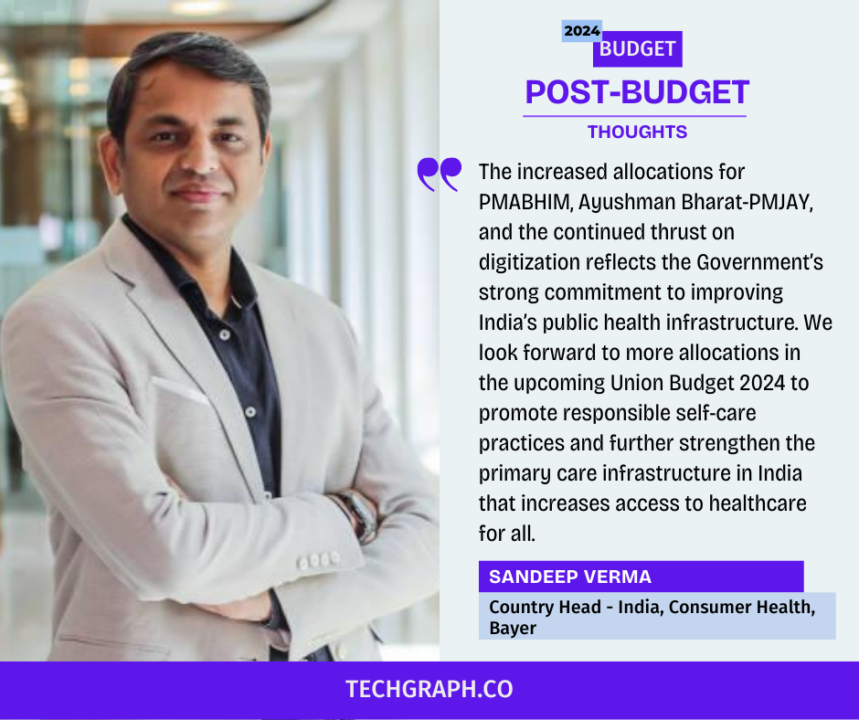
It is encouraging to see that the interim budget has taken into account nutrition delivery to the last mile. It sets the stage for creating a strong healthcare model for the country and signals that we are thinking ahead. The increased allocations for PMABHIM, Ayushman Bharat-PMJAY, and the continued thrust on digitization reflects the Government’s strong commitment to improving India’s public health infrastructure. We look forward to more allocations in the upcoming Union Budget 2024 to promote responsible self-care practices and further strengthen the primary care infrastructure in India that increases access to healthcare for all.
Dr. Nisha Bhatnagar, MBBS. MD (ObGyn), Medical Director of Infinite Fertility
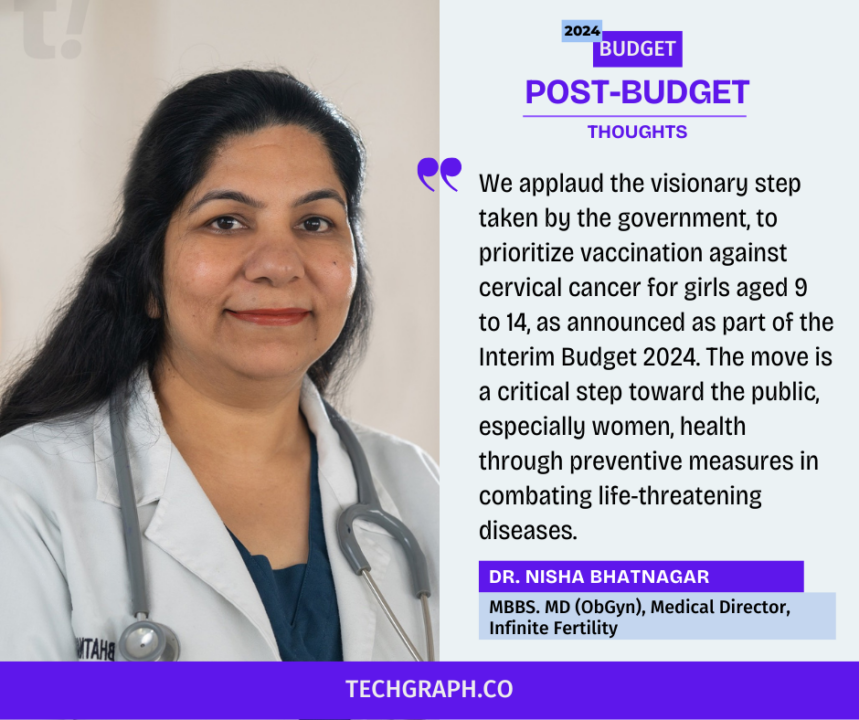
We applaud the visionary step taken by the government, to prioritize vaccination against cervical cancer for girls aged 9 to 14, as announced as part of the Interim Budget 2024. The move is a critical step toward the public, especially women, health through preventive measures in combating life-threatening diseases. As a recent contributor to cervical cancer prevention through our collaborative efforts with Aveya Fertility, we believe this initiative aligns seamlessly with our mission to enhance the well-being of individuals globally.
By investing in preventive healthcare, the government is not only safeguarding the health of the nation’s future generation but also reducing the burden on healthcare infrastructure. This initiative resonates with our commitment to advancing health outcomes through innovative solutions. We will be happy to support and collaborate with the government in achieving the shared goal of a healthier and happier society.
Pranav Bajaj, Co-Founder, Medulance Healthcare
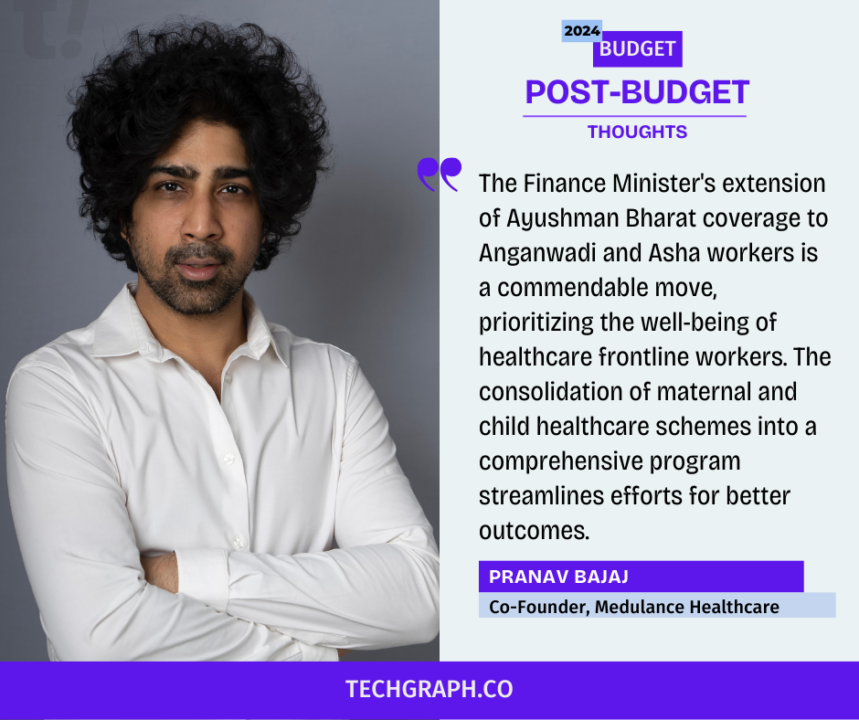
The Finance Minister’s extension of Ayushman Bharat coverage to Anganwadi and Asha workers is a commendable move, prioritizing the well-being of healthcare frontline workers. The consolidation of maternal and child healthcare schemes into a comprehensive program streamlines efforts for better outcomes. Committing to raise the Lakhpati Didi scheme target to Rs 3 crore reflects dedication to women’s economic empowerment. The emphasis on tech-savvy youth and innovation as a linchpin for national development is encouraging.
At Medulance, the launch of our Healthcare Academy aligns with the government’s vision, focusing on uplifting healthcare standards, and creating employment opportunities through training and upskilling. We launched the academy in collaboration with the children of Robin Hood Army with an aim to raise awareness about the significance of our commitment to ensure quick access to essential medical services, making healthcare universally accessible, equitable, and sustainable. The Medulance Healthcare Academy is committed to setting a benchmark for excellence, professionalism, and compassion. Our vision is to be the trusted guardian of health, fostering a safer and healthier society for all.
Tarun Gupta, Co-Founder, Lissun
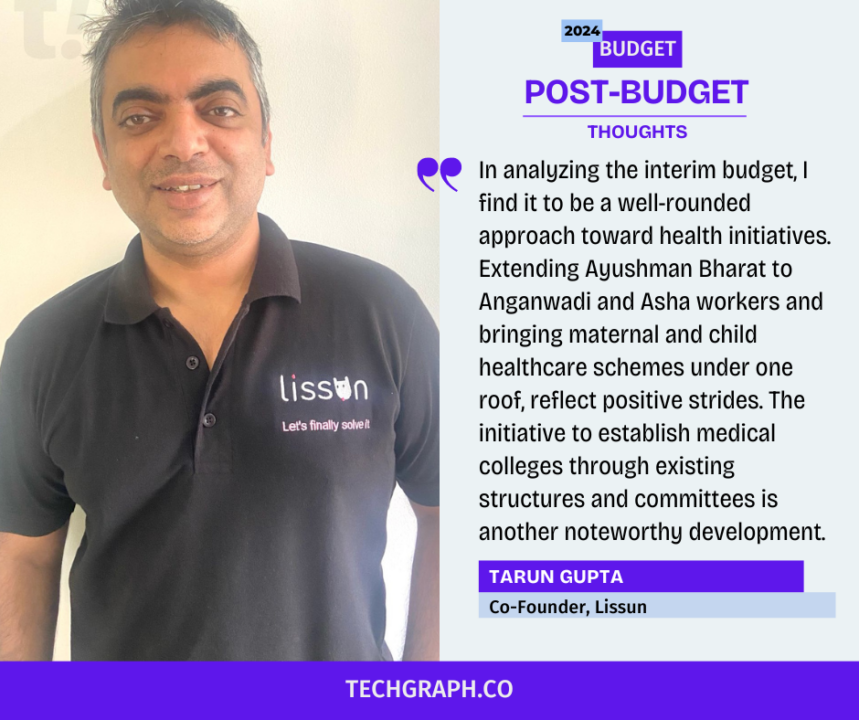
In analyzing the interim budget, I find it to be a well-rounded approach toward health initiatives. Extending Ayushman Bharat to Anganwadi and Asha workers and bringing maternal and child healthcare schemes under one roof, reflect positive strides. The initiative to establish medical colleges through existing structures and committees is another noteworthy development. Commendably, there is a strong commitment to Research and Development (R&D) with a substantial 1-lakh crore corpus allocated to the private sector. Additionally, India’s leadership is evident in STEM courses, boasting an impressive 43% women enrollment. However, as we await the post-election full budget, there’s a need for specific attention to the mental health sector. Allocating resources for infrastructure, qualified professionals, research, and destigmatization campaigns is imperative to address to escalating mental health crisis in India.
Arindam Sen, CEO & Director, Heartnet
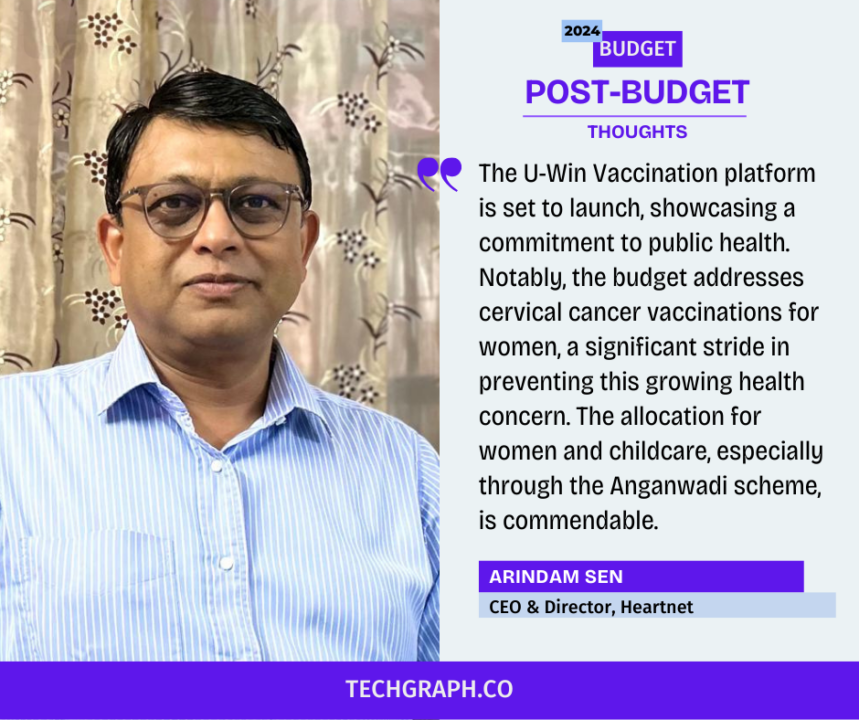
With the recent announcement of the sixth budget by Finance Minister Nirmala Sitharaman, there is a clear focus on vaccinations and digital infrastructure. The U-Win Vaccination platform is set to launch, showcasing a commitment to public health. Notably, the budget addresses cervical cancer vaccinations for women, a significant stride in preventing this growing health concern.
The allocation for women and childcare, especially through the Anganwadi scheme, is commendable. However, it’s worth noting that the digital healthcare sector, encompassing both private players and rural health, is not explicitly targeted in this interim budget. The Finance Minister highlighted positive trends in the Indian economy, emphasizing digital innovations and infrastructure, including digital healthcare. While the overall budget for healthcare appears promising, there is anticipation for additional reforms in this sector with the upcoming government budget.
Dr. Azad Moopen, Founder & Chairman, Aster DM Healthcare
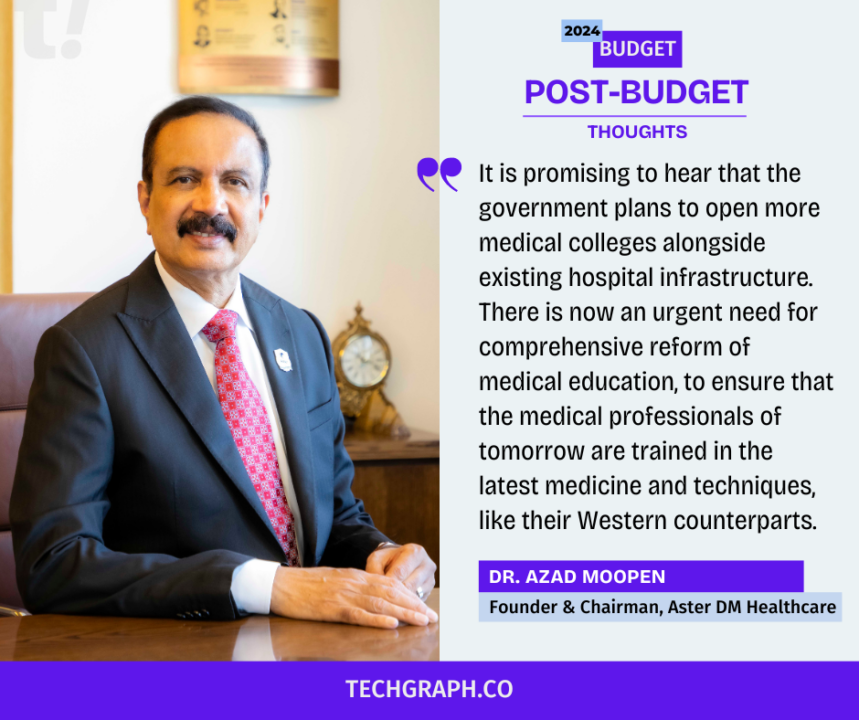
In healthcare we were hoping to see an increase in the GDP allocation of a minimum of 5% for the sector, hopefully, this will be addressed in the complete Budget to be announced in July this year, under the new government. We are glad that the government is considering adding more hospitals in all districts in the country, which is essential to meet the rising demand. We would recommend focusing on public-private partnerships (PPP) to address this. With all maternal and child healthcare to be brought under one- scheme, this will be essential.
It is promising to hear that the government plans to open more medical colleges alongside existing hospital infrastructure. There is now an urgent need for comprehensive reform of medical education, to ensure that the medical professionals of tomorrow are trained in the latest medicine and techniques, like their Western counterparts.
The strong impetus for immunization of children under Mission Indradhanush and young girls for cervical cancer will go a long way in strengthening preventive care measures in the country and reducing the burden of communicable and non-communicable diseases.
Parimal Heda, CIO, Digit Insurance
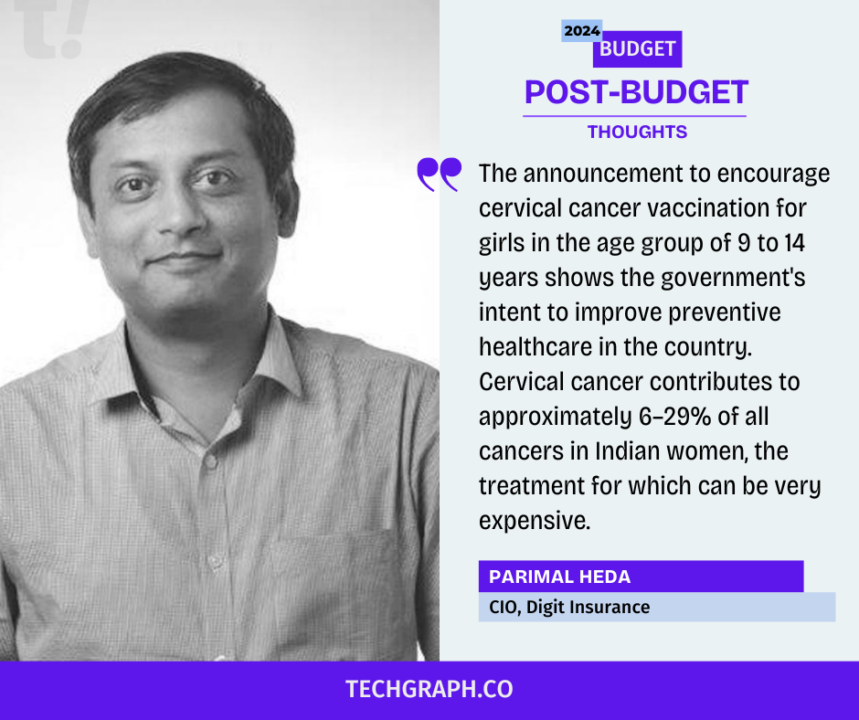
The announcement to encourage cervical cancer vaccination for girls in the age group of 9 to 14 years shows the government’s intent to improve preventive healthcare in the country. Cervical cancer contributes to approximately 6–29% of all cancers in Indian women, the treatment for which can be very expensive. Encouraging early vaccination will help in nipping the issue of rising cervical cancer cases in the bud. The announcements made towards managing immunization and nutrition delivery for maternal and child healthcare also clearly establish the government’s intent of creating a robust preventive healthcare ecosystem in the country. All these measures will lessen the burden on hospitalizations and subsequently on the health insurance sector in the long term.
Dr. Charit Bhograj, Founder & CEO, Tricog Health
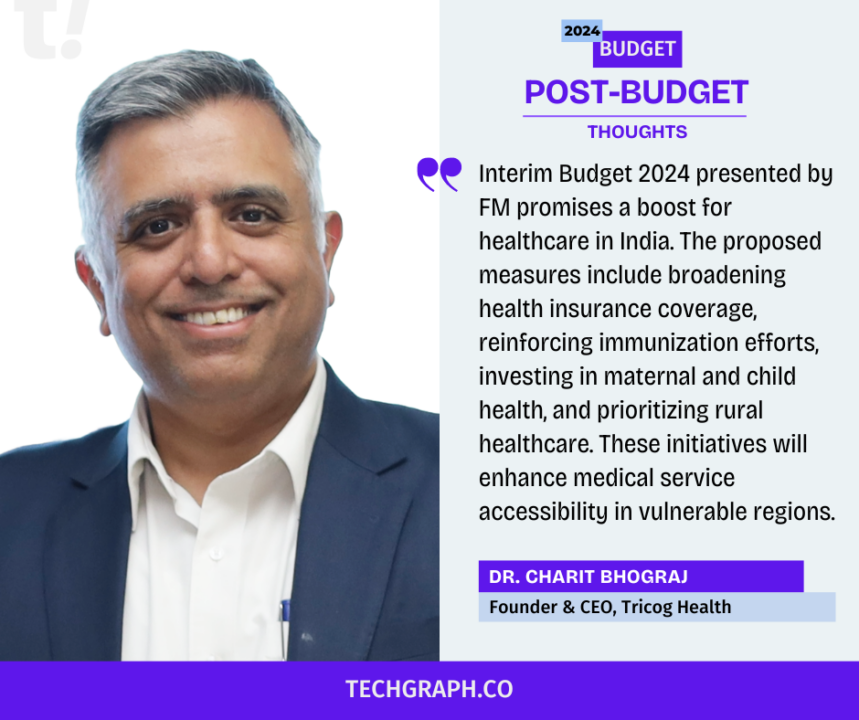
Interim Budget 2024 presented by Finance Minister Nirmala Sitharaman promises a boost for healthcare in India. The proposed measures include broadening health insurance coverage, reinforcing immunization efforts, investing in maternal and child health, and prioritizing rural healthcare. These initiatives will enhance medical service accessibility in vulnerable regions. The budget reflects a commitment to inclusivity, accessibility, and establishing a robust healthcare foundation for all citizens, signaling a significant move toward strengthening the healthcare infrastructure in the country.
Dr. Harshit Jain, Founder & Global CEO, Doceree
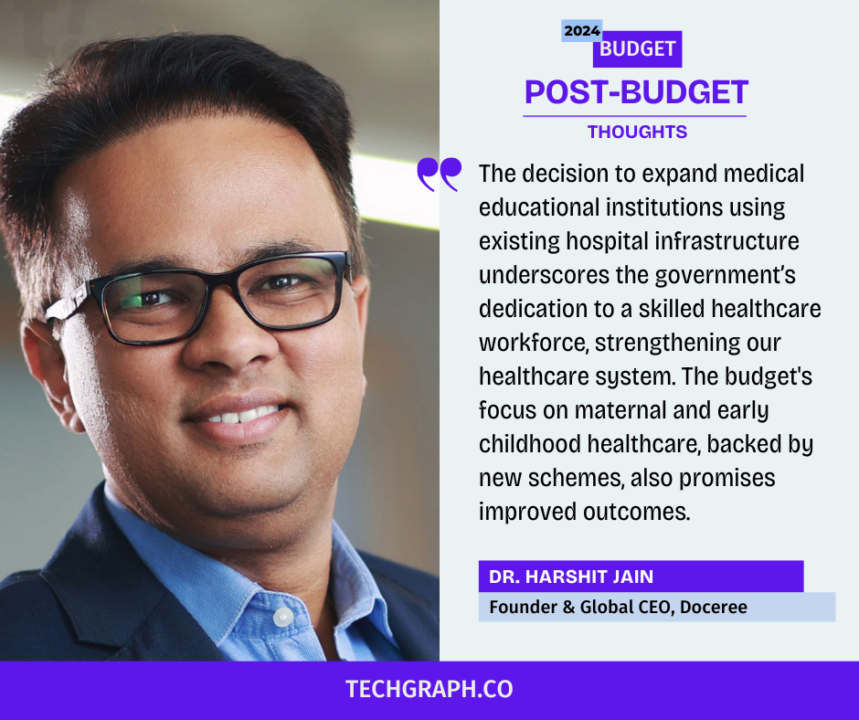
The FY 2024-25 interim budget, announced by our Hon’ble Finance Minister, heralds a transformative phase for all industries, including health tech. The allocation of 50-year interest-free loans for technology-supported startups is commendable, poised to inspire youth, fostering innovation for groundbreaking healthcare solutions. The re-emphasis on ‘Anusandhan’ reflects a push for high-level strategic research, reinforcing the pharmaceutical industry’s commitment to tailored treatments for India’s diverse population.
Further, the decision to expand medical educational institutions using existing hospital infrastructure underscores the government’s dedication to a skilled healthcare workforce, strengthening our healthcare system. The budget’s focus on maternal and early childhood healthcare, backed by new schemes, also promises improved outcomes. As a leader in healthcare transformation, Doceree wholeheartedly welcomes India’s persistent efforts to enhance healthcare efficacy through technology-driven initiatives.
Deepak Sharma, Co-founder and CEO, MedLern
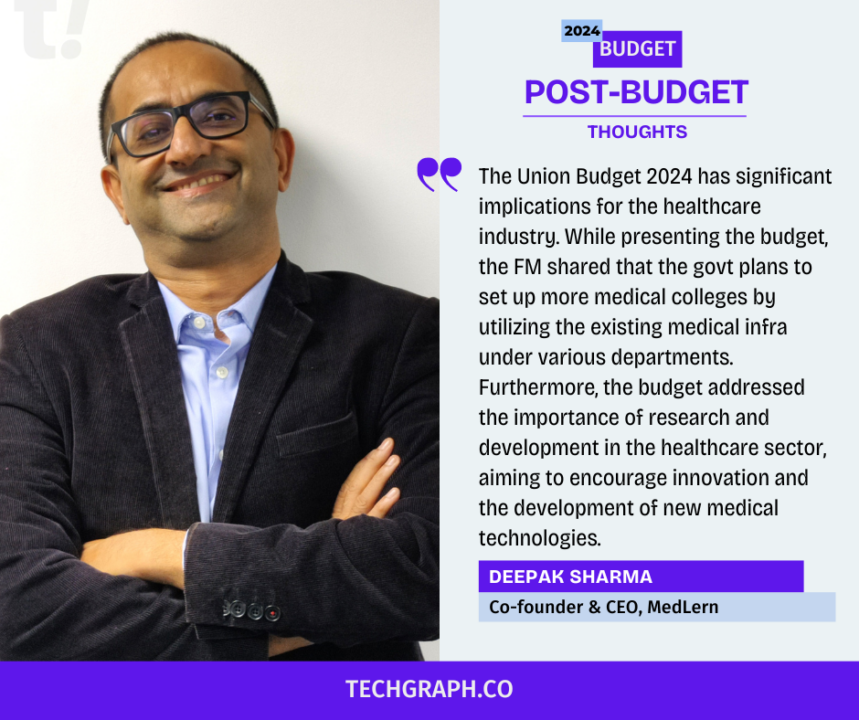
The Union Budget 2024 has significant implications for the healthcare industry. While presenting the budget, the Finance Minister shared that the government plans to set up more medical colleges by utilizing the existing medical infra under various departments.
Furthermore, the budget addressed the importance of research and development in the healthcare sector, aiming to encourage innovation and the development of new medical technologies. Increased funding for healthcare education and training programs is also evident, indicating a focus on building a skilled healthcare workforce.
The Prime Minister’s Mudra Yojana has approved 43 crore loans, totaling Rs. 22.5 lakh crore, to support the entrepreneurial ambitions of the youth. Initiatives such as the Fund of Funds, Startup India, and the Startup Credit Guarantee Schemes are playing a crucial role in aiding our young entrepreneurs. A fund of Rs. 1 lakh crore will be established through a 50-year interest-free loan to promote tech-savvy growth. This corpus aims to provide long-term financing with extended tenors and minimal to no interest rates. Such measures will incentivize private sectors to significantly amplify research and innovation, particularly in emerging domains, thereby greatly benefiting the MedTech industry.
The overall impact of the Union Budget 2024 on the healthcare industry is aimed at strengthening the foundation of the sector, promoting innovation, and ensuring better healthcare access for all segments of the population.
Sigal Atzmon, CEO & Founder, Medix Global
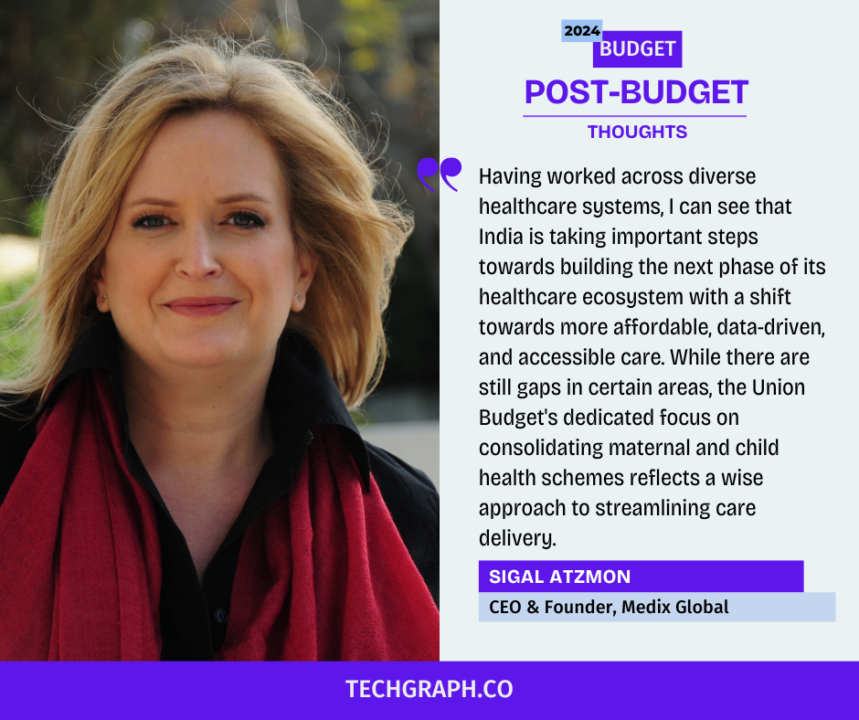
Having worked across diverse healthcare systems, I can see that India is taking important steps towards building the next phase of its healthcare ecosystem with a shift towards more affordable, data-driven, and accessible care. While there are still gaps in certain areas, the Union Budget’s dedicated focus on consolidating maternal and child health schemes reflects a wise approach to streamlining care delivery.
Additionally, the announcement encouraging vaccination for girls to prevent cervical cancer is a proactive step towards prioritizing preventive healthcare for women. Medix Global remains dedicated to collaborative efforts for a future defined by personalized care, inclusivity, and prevention, and we are confident that these initiatives will have a positive impact on healthcare delivery.
Pritika Singh, CEO, Prayag Hospitals Group

I applaud the forward-looking initiatives in the new budget. Extending the benefits of Ayushman Bharat to ASHA and Anganwadi workers demonstrates a commitment to comprehensive healthcare. The government’s focus on promoting vaccination for girls aged 9-14 to prevent cervical cancer is a crucial step towards a healthier future. The plan to establish more medical colleges further strengthens our healthcare infrastructure, ensuring a brighter and healthier tomorrow for all. These visionary measures underscore the collective responsibility towards building a resilient and inclusive healthcare ecosystem for the nation’s well-being.
Anish Bafna, CEO and MD, Healthium Medtech
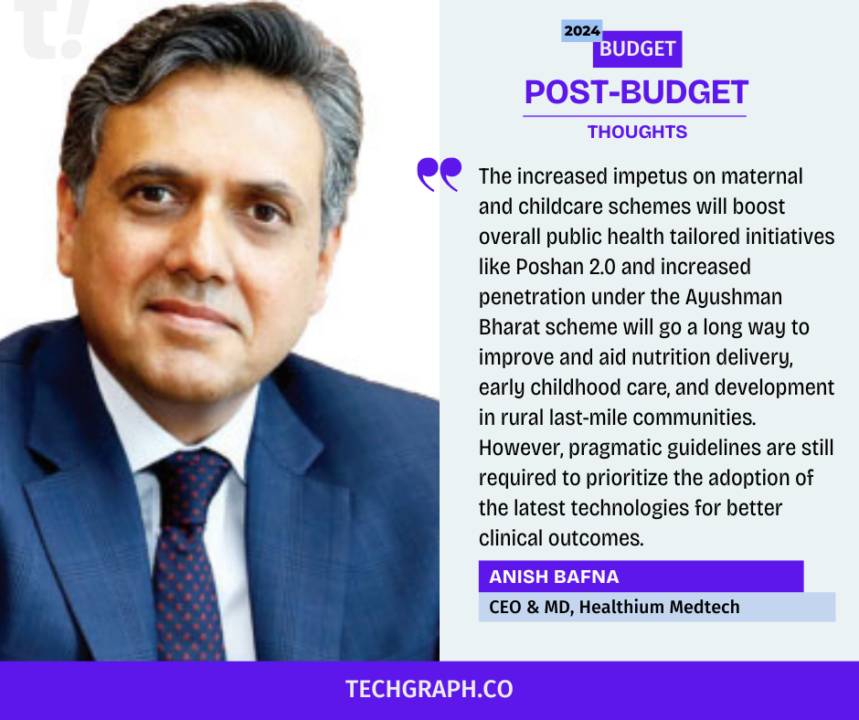
The Interim Budget of 2024 lays the foundation for our nation’s relentless roadmap towards Viksit Bharat 2047. The allocated corpus of 1 lakh for R&D and the new scheme to develop deep tech for defense purposes, along with 50-year interest-free loans, is a promising step to encourage the private sector towards scaling up research and innovation significantly in the sunrise sectors. The increased impetus on maternal and childcare schemes will boost overall public health. Furthermore, tailored initiatives like Poshan 2.0 and increased penetration under the Ayushman Bharat scheme will go a long way to improve and aid nutrition delivery, early childhood care, and development in rural last-mile communities. However, pragmatic guidelines are still required to prioritize the adoption of the latest technologies for better clinical outcomes and improved patient centricity.




